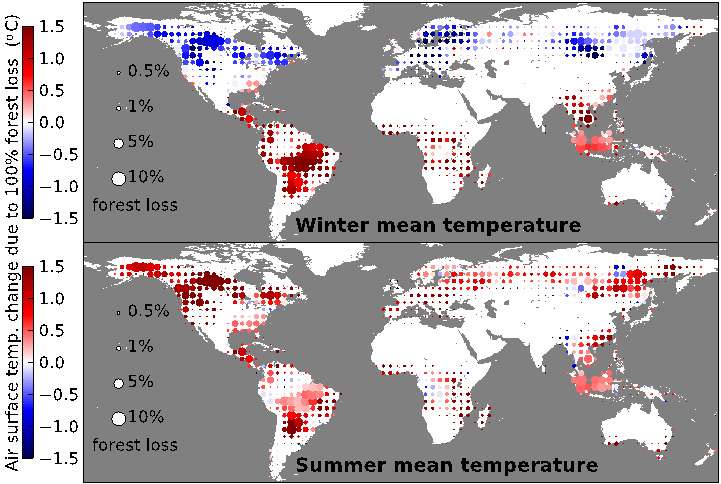February 5, 2016 report
Studies show impact of forest management and deforestation on climate

(Phys.org)—Two groups of researchers, one studying forests in Europe the other forests around the world, have found that forest management may not be the answer to slowing global warming that some had hoped, and that forests have other climate impacts that are not being taken into consideration when making global climate predictions. Both groups have published papers describing their studies and findings in the journal Science.
In the first study, a team made up of French researchers obtained historical data describing the numbers and types of trees in Europe going back to 1750—they then used that information to create a model that showed the impact that forests have had on climate change. That allowed them to see dramatic forest loss in the early years, which carried on for nearly a century. But then, as more food was imported into Europe, forests began to rebound—but they were managed, which meant certain types of trees were favored over others for commercial reasons. This led to the displacement of a large percentage of broad-leaf trees with conifers, which the researchers note, hold more carbon, but since they have been harvested the carbon has been released. They also found that because fir trees have needles instead of leaves, and because they are darker, there have been significant changes in evapotranspiration and albedo, causing temperatures in forested areas to rise. These findings, the model showed, meant that forest management in Europe has led to contributing to environmental warming rather than mitigating it.
In the second study, a pair of researchers (Ramdane Alkama and Alessandro Cescatti) with the European Commission's Institute for Environment and Sustainability found by studying satellite data that showed both global forest cover and land surface temperatures, that forest loss causes an increase in diurnal temperature variations in areas of deforestation, which tends to lead to an increases in mean and maximum air temperatures. It also causes a significant amount of warming when compared to carbon dioxide emissions from land-use change.

Taken together the two studies suggest that forest management is far more complex than has been believed—changing tree types or deforestation can directly cause warming, for example, and thus future management initiatives need to take such factors into consideration if the goal is a positive climate impact.
More information: 1. K. Naudts et al. Europes forest management did not mitigate climate warming, Science (2016). DOI: 10.1126/science.aad7270
Abstract
Afforestation and forest management are considered to be key instruments in mitigating climate change. Here we show that since 1750, in spite of considerable afforestation, wood extraction has led to Europe's forests accumulating a carbon debt of 3.1 petagrams of carbon. We found that afforestation is responsible for an increase of 0.12 watts per square meter in the radiative imbalance at the top of the atmosphere, whereas an increase of 0.12 kelvin in summertime atmospheric boundary layer temperature was mainly caused by species conversion. Thus, two and a half centuries of forest management in Europe have not cooled the climate. The political imperative to mitigate climate change through afforestation and forest management therefore risks failure, unless it is recognized that not all forestry contributes to climate change mitigation.
2. R. Alkama et al. Biophysical climate impacts of recent changes in global forest cover, Science (2016). DOI: 10.1126/science.aac8083
Abstract
Changes in forest cover affect the local climate by modulating the land-atmosphere fluxes of energy and water. The magnitude of this biophysical effect is still debated in the scientific community and currently ignored in climate treaties. Here we present an observation-driven assessment of the climate impacts of recent forest losses and gains, based on Earth observations of global forest cover and land surface temperatures. Our results show that forest losses amplify the diurnal temperature variation and increase the mean and maximum air temperature, with the largest signal in arid zones, followed by temperate, tropical, and boreal zones. In the decade 2003–2012, variations of forest cover generated a mean biophysical warming on land corresponding to about 18% of the global biogeochemical signal due to CO2 emission from land-use change.
Journal information: Science
© 2016 Phys.org



















